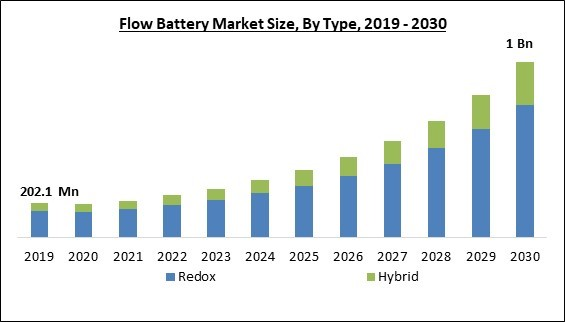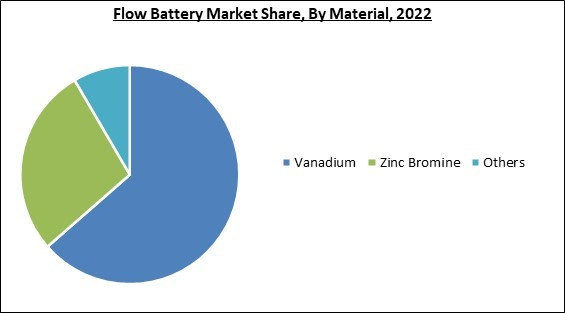Due to their widespread use in developed nations like Japan and Australia, flow batteries are in great demand throughout the region. Therefore, the Asia Pacific region generated $92,427.3 Thousands revenue in the market in 2022. In these nations, the use of flow batteries in industrial, commercial, and utility applications is expanding quickly. Furthermore, the expansion is being fueled by the region's rapid industrial development in developing nations like China and India. Some of the factors impacting the market are investments in renewable energy are rising, an increase in the need for backup power in data centers, and low development requirements and large investment costs.
One of the main applications of flow battery is to store renewable energy. Industrialized and emerging nations have been updating their energy policies to accommodate a sizeable amount of energy generated from renewable energy resources, such as wind and solar. These nations include the US, India, China, Australia, and Japan. Investments in renewable energy are rising globally due to governmental financial support and related long-term benefits. Developers are now evaluating these technologies for their capacity to provide electricity for longer periods and to ramp up and down without degradation. Data centers need a consistent and dependable power source to minimize data loss and sustain uninterrupted operations. The rise in cloud computing and digital services has increased the need for data centers, increasing demand for flow batteries to ensure continuous availability. The beneficial features of flow batteries, such as their high energy capacity and storage capacities, make them suitable for data center applications. Additionally, because flow batteries have a longer minimum lifespan of 20 years and are frequently changed every four years under normal circumstances, there is an expected requirement for them. Thus, the market for flow batteries is anticipated to expand due to the growing requirement for power backup in data centers.
However, flow batteries are manufactured by several companies, and they differ in terms of their functional design, technical specifications, components, energy storage capacity, etc. It has become difficult for end users to compare the performance of two flow battery systems or to use two distinct devices. It necessitates the creation of specific standards for the advancement of flow batteries. Costs for materials, components, installations, maintenance, and repairs are included in the overall cost. For SMEs, this may need substantial expenditure. Therefore, in the coming years, this factor is anticipated to restrain the growth of the market.
Type Outlook
Based on type, the market is segmented into redox and hybrid. The hybrid segment acquired a substantial revenue share in the market in 2022. The most recent and non-pure variety of flow batteries are hybrid ones. Hybrid flow batteries have recently become increasingly popular for large-scale energy storage applications. They are ideal for grid-scale energy storage, the integration of renewable energy sources, and backup power systems due to their potential to efficiently store and rapidly release large amounts of energy. Hybrid flow batteries differ from other energy storage technologies because their architecture enables simple maintenance and offers the possibility of longer operational human life.Material Outlook
Based on material, the market is fragmented into vanadium, zinc bromine, and others. In 2022, the vanadium segment held the highest revenue share in the market. Most flow batteries use vanadium electrolytes, which may provide stable charging and discharge for numerous cycles without degradation. It is made possible by the electrochemical properties of vanadium, which make it simple to remove electrons from the element and then add them back. The vanadium redox flow battery (VRFB), a suitable redox flow battery (RFB), uses vanadium redox couplings (V2+/V3+ in the negative and V4+/V5+ in the positive half-cells) to store energy.
Application Outlook
Based on application, the market is segmented into utilities, commercial & industrial, EV charging stations, and other applications. In 2022, the utilities segment witnessed the largest revenue share in the market. Utility applications normally use flow batteries to function as a balancing act between the supply of energy from the electric grid and the demand for electricity. Due to flow batteries' consistent ability to store and discharge power, utility owners may be able to reduce the quantity of excess electricity generated.Regional Outlook
Region wise, the market is analyzed across North America, Europe, Asia Pacific, and LAMEA. The North America region procured a promising growth rate in the market in 2022. The growth of the regional market is owed to the greater usage of more sophisticated ticketing technology, boosting the overall passenger experience. Additionally, numerous operational flow battery installations in North America have high power ratings. The region's growing efforts in promoting the use of renewable energy are also creating the potential for the market to grow rapidly throughout the forecast year.The market research report covers the analysis of key stake holders of the market. Key companies profiled in the report include VRB Energy, Inc. (Ivanhoe Electric Inc.), Invinity Energy Systems plc, Redflow Limited, ViZn Energy, Inc., Gebr. SCHMID GmbH, Elestor BV, Largo Inc., Stryten Energy LLC (Atlas Holdings LLC), Sumitomo Electric Industries, Ltd., Lockheed Martin Corporation.
Strategies Deployed in the Market
- 2023-Apr: Redflow Limited received approval from California Public Utilities Commission (CPUC) for its zinc-bromine flow battery solution.
- 2023-Mar: Invinity Energy Systems plc signed a distribution partnership with STS Group, an electronic equipment supplier. The partnership would strengthen Invinity's position as a provider of energy storage solutions within the Hungarian market.
- 2023-Jan: Stryten Energy signed a partnership with Snapping Shoals EMC, a residential and commercial security solutions provider, to test its vanadium redox flow battery (VRFB) technology in a variety of cases. The partnership would allow Stryten to gain insights into the usage of its VFRB technology in various cases.
- 2022-Sep: Redflow Limited came into partnership with Empower Energies, a solar energy solutions provider, to provide flow battery and solar energy solutions for North American markets. The solutions developed in the course of the partnership would allow the two companies to provide North American customers with safe and sustainable renewable energy solutions.
- 2022-Aug: Largo Inc. signed an agreement with Ansaldo Green Tech S.P.A., a renewable energy solutions provider, to deploy flow battery solutions in European, Middle Eastern, and African regions. The partnership would position the two companies to address the demand for renewable energy needs within the mentioned regions.
- 2022-Jan: Stryten Energy announced the acquisition of Storion Energy Inc., a commercial vanadium redox flow battery (VRFB) technology provider. Through the acquisition, Stryten would be better positioned to serve the North American market with innovative energy solutions.
- 2021-Nov: Stryten Energy announced the acquisition of Galvion Vehicle Power, a protective equipment manufacturer. The acquisition strengthens Stryten's capability in providing customers with clean energy solutions.
Scope of the Study
Market Segments Covered in the Report:
By Type
- Redox
- Hybrid
By Material
- Vanadium
- Zinc Bromine
- Others
By Storage (Volume, Units, USD Thousands, 2019-2030)
- Large Scale
- Small Scale
By Application (Volume, Units, USD Thousands, 2019-2030)
- Utilities
- Commercial & Industrial
- EV Charging Stations
- Others
By Geography (Volume, Units, USD Thousands, 2019-2030)
- North America
- US
- Canada
- Mexico
- Rest of North America
- Europe
- Germany
- UK
- France
- Russia
- Spain
- Italy
- Rest of Europe
- Asia Pacific
- China
- Japan
- India
- South Korea
- Singapore
- Malaysia
- Rest of Asia Pacific
- LAMEA
- Brazil
- Argentina
- UAE
- Saudi Arabia
- South Africa
- Nigeria
- Rest of LAMEA
Key Market Players
List of Companies Profiled in the Report:
- VRB Energy, Inc. (Ivanhoe Electric Inc.),
- Invinity Energy Systems plc
- Redflow Limited
- ViZn Energy, Inc.
- Gebr. SCHMID GmbH
- Elestor BV
- Largo Inc.
- Stryten Energy LLC (Atlas Holdings LLC)
- Sumitomo Electric Industries, Ltd.
- Lockheed Martin Corporation
Unique Offerings
- Exhaustive coverage
- The highest number of Market tables and figures
- Subscription-based model available
- Guaranteed best price
- Assured post sales research support with 10% customization free
Table of Contents
Companies Mentioned
- VRB Energy, Inc. (Ivanhoe Electric Inc.),
- Invinity Energy Systems plc
- Redflow Limited
- ViZn Energy, Inc.
- Gebr. SCHMID GmbH
- Elestor BV
- Largo Inc.
- Stryten Energy LLC (Atlas Holdings LLC)
- Sumitomo Electric Industries, Ltd.
- Lockheed Martin Corporation










